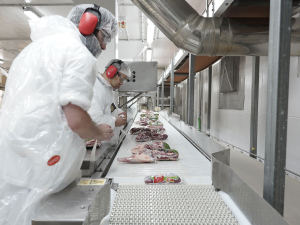Farmer confidence dips slightly, but positivity still dominates
Farmer confidence has taken a slight dip according to the final Rabobank rural confidence survey for the year.
 The reports says investors in disruptive innovations will need more prudence when it comes to food products.
The reports says investors in disruptive innovations will need more prudence when it comes to food products.
In the next few years, the global consumer food industry will see a shift in innovation strategies as large food companies refocus their attentions on incremental changes as opposed to disruptive innovations.
That’s according to a report by Rabobank, which says that the consumer food industry has witnessed an explosion of disruptive innovation for food products over the past decade. This includes things such as plantbased meats, synthetic fat replacements and precision fermented milk proteins.
But the report claims that this disruption has already reached its peak. It says that between 2010 and 2022, global consumer food saw a 288% increase in investments of food innovation. This is partly attributed to the adventurous and experimental palates of millennials and Gen Z.
Rabobank senior consumer food analyst Thomas Bailey says that weaker demand for disruptive innovations, economic uncertainty, and the higher interest rate environment have exacted their toll on many disruptive products coming to market.
“The same group of investors that drove the 288% increase in deals appears to have put the brakes on deals so far in 2023.”
He believes in future, disruptive innovations will likely face more rigorous evaluation, resulting in fewer but potentially more successful disruptive products that have endured more intensive vetting.
Bailey adds that incremental innovation – creating new value through minor product or service adjustments such as packaging changes or new flavours – is considered safer. The report says consumer food companies will likely focus more on prioritising improving taste, convenience and health – rather than making more demanding and risky investments in unproven products.
“The main benefit of incremental innovation is that it offers more immediate benefits: supply chain simplicity, sustainability, cost reduction, and generally keeping customers happy and interested. Furthermore, it is better suited to keeping prices low for consumers in an inflationary environment like the one we have today.”
The report points to some big names in the food space, which have recently announced moves to incremental innovation: The likes of McDonalds announcing it will be revamping older products with a twist, such as the limited Chicken Big Mac, and optimising existing traditional products for taste.
It adds that those who continue to invest in disruptive innovations will need to exercise even more prudence when it comes to food products.
“They will need to take more steps to ensure product alignment with consumers in terms of taste, health, and convenience,” Bailey explains. “Investors who continue to seek out disruptive innovations will be a good source of insight for large food companies that are currently shifting to incremental innovation but need to keep an eye on the longer-term horizon.”
What is Disruptive Innovation?
Disruptive innovation, first described in a Harvard business journal in 1995, posits that smaller companies with fewer resources target segments of the economy overlooked by larger incumbents.
By successfully targeting overlooked markets with little competition from the larger incumbents, the smaller company grows, gaining mainstream market share while retaining their original bases. This makes the niche product mainstream, cutting into the incumbents share or even replacing them and “disrupting” the economic status quo.
Just because a small business shakes up the status quo does not necessarily make it disruptive; it has to either target an overlooked demographic or create new consumer demographics.
Additionally, many disruptive products start off not immediately meeting mainstream standards, such as early telephones being very expensive to own and only capable of short distance calls.
Herd improvement company LIC has posted a 5.2% lift in half-year revenue, thanks to increasing demand for genetics.
According to the latest Fresh Produce Trend Report from United Fresh, 2026 will be a year where fruit and vegetables are shaped by cost pressures, rapid digital adoption, and a renewed focus on wellbeing at home.
The Roar is a highlight of the game hunting calendar in New Zealand, with thousands of hunters set to head for the hills to hunt male stags during March and April.
OPINION: The past few weeks have been tough on farms across the North Island: floods and storms have caused damage and disruption to families and businesses.
European dairy giant Arla Foods celebrated its 25th anniversary as a cross-border, farmer-owned co-operative with a solid half-year result.
The sale of Fonterra’s global consumer and related businesses is expected to be completed within two months.

OPINION: Meanwhile, red blooded Northland politician Matua Shane Jones has provided one of the most telling quotes of the year…
OPINION: This old mutt has been around for a few years now and it seems these ‘once in 100-year’ weather…